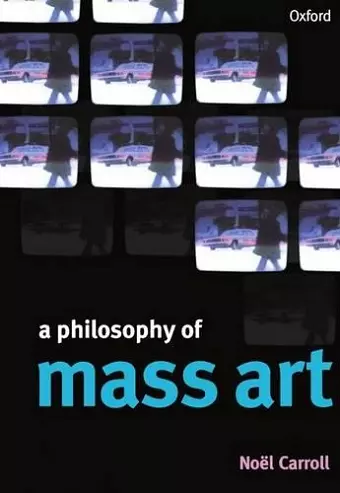A Philosophy of Mass Art
Format:Paperback
Publisher:Oxford University Press
Published:29th Jan '98
Currently unavailable, and unfortunately no date known when it will be back

We live in a world dominated by mass art. Movies, TV, pulp literature, comics, rock music -- both broadcast and recorded -- surround us everywhere in the industrialized world and beyond. However, despite the fact that for the majority mass art supplies the primary source of aesthetic experience, the area has been neglected entirely by analytic philosophers of art. In A Philosophy of Mass Art, Noël Carroll, a leading figure in the field of aesthetic philosophy, attempts to address this lacuna. He shows why philosophers have previously resisted and/or misunderstood mass art and he develops frameworks for understanding the relation of mass art to the emotions, morality, and ideology; discussing the accounts of such theorists in the field as Collingwood, Adorno, Benjamin, McCluhan, and Fiske. Mixing conceptual analysis with many vivid examples, the author proposes the first significant attempt at a philosophy of mass art in the analytical tradition, concluding there are strong grounds for approaching mass art in the same fashion as high art.
Noel Carroll has written an interesting and thoughtprovoking book...compelling...Its strengths lie in the development of the author's own arguments regarding the relationship of mass art to emotion, morality, and ideology. These arguments come in the final three chapters of this book, and they are excellent./Hugh Mercer Curtler/Journal of Aesthetic Education, Vol.33, No.3, fall 1999.
the very term around which his elaborate train of thought revolves, "mass art", turns out to be somewhat patronising in itself ... Nevertheless, the sheer clarity of argument, and the range of the ideas explored and clarified, compensates for the embarrassment. This is an unusual book and unravels whole skeins of arguments in a useful way. * The Times Higher Education Supplement *
Carroll succeeds admirably in his aim of clarifying the nature of mass art, and its relation to the emotions, to morality and to idealogy. Clarity is his forte. This might even qualify as a work of mass philosophy: just like mas art, the book is 'comprehensible for untrained audiences, virtually on the first go-around'/Justine Kingsbury, Australasian Journal of Philosophy Vol. 81,No.1
ISBN: 9780198742371
Dimensions: 234mm x 156mm x 25mm
Weight: 661g
438 pages